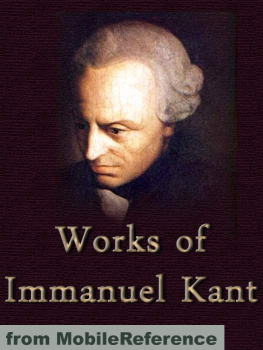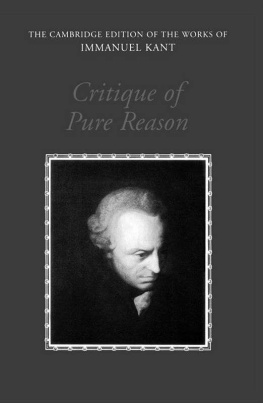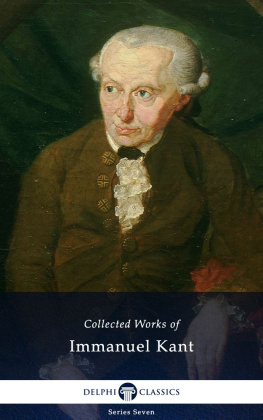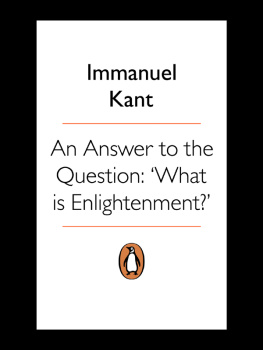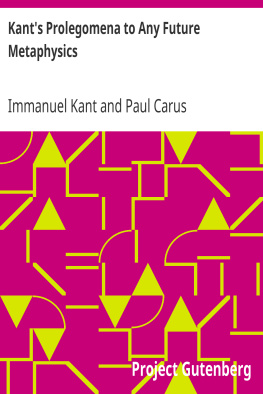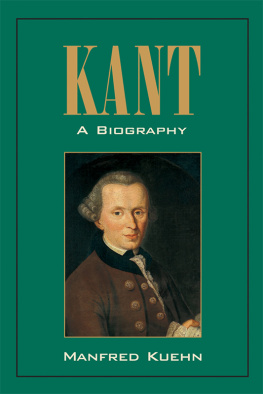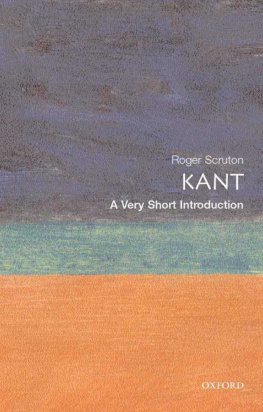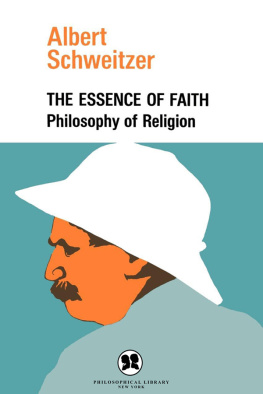Works of Immanuel Kant from MobileReference
(1780)
( Kritik der reinen Vernunft ) (1781, 1787)
( Prolegomena zu einer jeden knftigen Metaphysik ) (1783)
( Beantwortung der Frage: Was ist Aufklrung? ) (1784)
( Idee zu einer allgemeinen Geschichte in weltbrgerlicher Absicht ) (1784)
(1785)
( Grundlegung zur Metaphysik der Sitten ) (1785)
( Kritik der praktischen Vernunft ) (1788)
(Kritik der Urteilskraft) (1790)
( Zum ewigen Frieden ) (1795)
(Metaphysische Anfangsgrnde der Rechtslehre ) (1797). [First part of The Metaphysics of Morals .]
Appendix:
Critique of Practical Reason ( Kritik der praktischen Vernunft )
by Immanuel Kant
Translated by Thomas Kingsmill Abbott
Electronically Developed by MobileReference
PREFACE
This work is called the Critique of Practical Reason, not of the pure practical reason, although its parallelism with the speculative critique would seem to require the latter term. The reason of this appears sufficiently from the treatise itself. Its business is to show that there is pure practical reason, and for this purpose it criticizes the entire practical faculty of reason. If it succeeds in this, it has no need to criticize the pure faculty itself in order to see whether reason in making such a claim does not presumptuously overstep itself (as is the case with the speculative reason). For if, as pure reason, it is actually practical, it proves its own reality and that of its concepts by fact, and all disputation against the possibility of its being real is futile.
With this faculty, transcendental freedom is also established; freedom, namely, in that absolute sense in which speculative reason required it in its use of the concept of causality in order to escape the antinomy into which it inevitably falls, when in the chain of cause and effect it tries to think the unconditioned. Speculative reason could only exhibit this concept (of freedom) problematically as not impossible to thought, without assuring it any objective reality, and merely lest the supposed impossibility of what it must at least allow to be thinkable should endanger its very being and plunge it into an abyss of scepticism.
Inasmuch as the reality of the concept of freedom is proved by an apodeictic law of practical reason, it is the keystone of the whole system of pure reason, even the speculative, and all other concepts (those of God and immortality) which, as being mere ideas, remain in it unsupported, now attach themselves to this concept, and by it obtain consistence and objective reality; that is to say, their possibility is proved by the fact that freedom actually exists, for this idea is revealed by the moral law.
Freedom, however, is the only one of all the ideas of the speculative reason of which we know the possibility a priori (without, however, understanding it), because it is the condition of the moral law which we know. The ideas of God and immortality, however, are not conditions of the moral law, but only conditions of the necessary object of a will determined by this law; that is to say, conditions of the practical use of our pure reason. Hence, with respect to these ideas, we cannot affirm that we know and understand, I will not say the actuality, but even the possibility of them. However they are the conditions of the application of the morally determined will to its object, which is given to it a priori , viz., the summum bonum . Consequently in this practical point of view their possibility must be assumed, although we cannot theoretically know and understand it. To justify this assumption it is sufficient, in a practical point of view, that they contain no intrinsic impossibility (contradiction). Here we have what, as far as speculative reason is concerned, is a merely subjective principle of assent, which, however, is objectively valid for a reason equally pure but practical, and this principle, by means of the concept of freedom, assures objective reality and authority to the ideas of God and immortality. Nay, there is a subjective necessity (a need of pure reason) to assume them. Nevertheless the theoretical knowledge of reason is not hereby enlarged, but only the possibility is given, which heretofore was merely a problem and now becomes assertion, and thus the practical use of reason is connected with the elements of theoretical reason. And this need is not a merely hypothetical one for the arbitrary purposes of speculation, that we must assume something if we wish in speculation to carry reason to its utmost limits, but it is a need which has the force of law to assume something without which that cannot be which we must inevitably set before us as the aim of our action.
It would certainly be more satisfactory to our speculative reason if it could solve these problems for itself without this circuit and preserve the solution for practical use as a thing to be referred to, but in fact our faculty of speculation is not so well provided. Those who boast of such high knowledge ought not to keep it back, but to exhibit it publicly that it may be tested and appreciated. They want to prove: very good, let them prove; and the critical philosophy lays its arms at their feet as the victors. Quid statis? Nolint. Atqui licet esse beatis. As they then do not in fact choose to do so, probably because they cannot, we must take up these arms again in order to seek in the mortal use of reason, and to base on this, the notions of God, freedom, and immortality, the possibility of which speculation cannot adequately prove.
Here first is explained the enigma of the critical philosophy, viz.: how we deny objective reality to the supersensible use of the categories in speculation and yet admit this reality with respect to the objects of pure practical reason. This must at first seem inconsistent as long as this practical use is only nominally known. But when, by a thorough analysis of it, one becomes aware that the reality spoken of does not imply any theoretical determination of the categories and extension of our knowledge to the supersensible; but that what is meant is that in this respect an object belongs to them, because either they are contained in the necessary determination of the will a priori , or are inseparably connected with its object; then this inconsistency disappears, because the use we make of these concepts is different from what speculative reason requires. On the other hand, there now appears an unexpected and very satisfactory proof of the consistency of the speculative critical philosophy. For whereas it insisted that the objects of experience as such, including our own subject, have only the value of phenomena, while at the same time things in themselves must be supposed as their basis, so that not everything supersensible was to be regarded as a fiction and its concept as empty; so now practical reason itself, without any concert with the speculative, assures reality to a supersensible object of the category of causality, viz., freedom, although (as becomes a practical concept) only for practical use; and this establishes on the evidence of a fact that which in the former case could only be conceived. By this the strange but certain doctrine of the speculative critical philosophy, that the thinking subject is to itself in internal intuition only a phenomenon, obtains in the critical examination of the practical reason its full confirmation, and that so thoroughly that we should be compelled to adopt this doctrine, even if the former had never proved it at all.
By this also I can understand why the most considerable objections which I have as yet met with against the Critique turn about these two points, namely, on the one side, the objective reality of the categories as applied to noumena, which is in the theoretical department of knowledge denied, in the practical affirmed; and on the other side, the paradoxical demand to regard oneself qua subject of freedom as a noumenon, and at the same time from the point of view of physical nature as a phenomenon in one's own empirical consciousness; for as long as one has formed no definite notions of morality and freedom, one could not conjecture on the one side what was intended to be the noumenon, the basis of the alleged phenomenon, and on the other side it seemed doubtful whether it was at all possible to form any notion of it, seeing that we had previously assigned all the notions of the pure understanding in its theoretical use exclusively to phenomena. Nothing but a detailed criticism of the practical reason can remove all this misapprehension and set in a clear light the consistency which constitutes its greatest merit.

